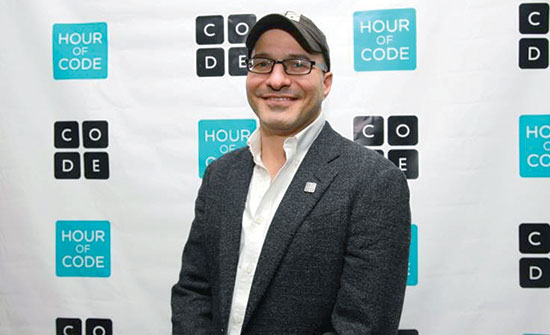A Chat With Hadi Partovi, Founder of Code.org
By Joan Baum, Ph.D.

Hadi Partovi, entrepreneurial founder of the non-profit Code.org, which was launched in January 2013, is so passionate and confident about the cause - “Computer Science is For Everyone,” but especially for students underrepresented in the online generation - women and minorities – that he already risked doing something that might at first sound like a gimmick. But lo! He did it - and lo! It not only worked, it worked spectacularly to judge from the overwhelming response.
What he did was the subject of a TEDx talk he gave recently in a manner that was not only engaging but persuasive, though readers can and should see for themselves by going online at Code.org. The year before he had organized an Hour of Code grassroots movement nationwide, challenging students to complete short programming tutorials during Computer Science Education Week. He anticipated skepticism. What can one hour do? The response was unbelievable. What he did was attract hundreds of business and education partners at the start, including 50,000 teachers who, fueled by the idea, carried it into their middle school and high school classrooms. The reaction, as the numbers show, has been astounding, and the “seed” he planted took root at all levels: district, city, state, nation, as teachers signed on for training. Hadi Partovi’s ultimate goal is global-- there are one billion students out there world wide, he notes.
Despite the name “Code.org” Hadi Partovi has wider goals: to get students to learn and love computer science. He’d like, of course, students to acquire hard skills - to know what algorithms are, how to make APPs, and to understand the workings of the Internet. But his pervasive hope is to get students to realize how creative they can be doing code, thereby gaining confidence in themselves, welcoming collaboration and being able to say, “I can make this, I can do this.” Computers are fun and learning simple code relatively easy, Partovi says. Programming skills he argues will enable students to participate in the world competitively. They don’t have to become computer programmers, but they should know that no discipline or subject will evolve in this century without “a solid grounding in technology.” In schools, when students learn about water or photosynthesis, it doesn’t mean they will go out to become botanists. It does mean basic science literacy. The world has already been dramatically changed by technology, he points out, affecting jobs. Understanding how technology works is “the foundation for every career.” As he says in his TED talk, .. trucks will soon drive themselves, robots will flip burgers,” but look around, despite progress in the last two years in getting more schools to offer computer science classes, many districts still don’t provide professional development training to teachers.
A 43-year old Iranian-American whose family emigrated to this country during the Iran/ Iraq war, Hadi Partovi is himself an example of the kind of student he would inspire. He went to Harvard, became a computer programmer and then a venture capitalist and angel investor, now CEO and founder of Code.org. But it was his earlier life that chartered his course. His father gave him and his brother Ali a computer. At that time there were no APPs, no games, so he and his brother really learned all about computers. His arrival in the United States in the 80s coincided with the great economic boom in the tech industry and he was ready. He took on summer work as a programmer, the idea for Code.org coming to him on the day of Steve Jobs’ death in 2011. After raising funds for Code.org from various tech companies and their founders, he was off and running.
In the last couple of years, he notes that progress has been made at all governmental levels. States have come on board - important because education is a state right. Policy changes to make computer science a part of the math-science core curriculum would be initiated at this level.
Internationally, the UK, South Korea, Saudi Arabia, Argentina, Australia and Italy in particular have “rolled out computer science as part of their national curricula,” and nine out of ten parents in this country indicate they want computer science classes in their schools. Teachers themselves are advocating more and more, some in fact going beyond suggestions of Code.org and insisting that computer science be mandatory instruction.
The future, says Hadi Partovi, will involve training more teachers, which has already begun at the elementary school level because it’s relatively easy to do there. Lower-grade teachers and librarians hear about Code.org and sign up for training, which means a weekend or a workshop an hour a week for half a year. Companies have already offered their offices and most schools have some kind of computer lab. As of the end of 2015, the Code.org website shows, “six million students" were enrolled in Code.org classes, and the organization has recently partnered with College Board to develop advanced placement computer classes. The number of participating teachers is also growing rapidly. But a lot remains to be done. The website offers free coding lessons.
*This was a local TED (Technology, Entertainment, Design) talk, independent of the TED conferences. #
